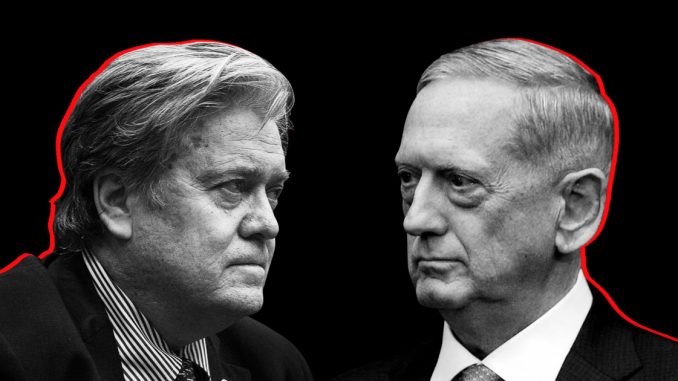

Bannon remarks to German Ambassador recall infamous 2014 Vatican speech endorsing “strong nationalist movements”, in preference to EU. German & other diplomats alarmed at lack of appreciation for EU’s role insuring peace and prosperity in post-war Europe. “There appears to be no understanding in the White House that an unravelling of the EU would have grave consequences.” US support for right-wing populists in upcoming European elections would trigger “a major trans-Atlantic crisis.”
“In the week before U.S. Defense Secretary Jim Mattis and Vice President Mike Pence
pledged US “steadfast and enduring” commitment to the European Union,
White House chief strategist Steve Bannon met with a German diplomat
and delivered a very different message, according to people familiar with the talks.
Bannon, these people said, signalled to Germany’s ambassador to Washington that
he viewed the EU as a flawed construct
and favoured conducting relations with Europe on a bilateral basis.
THREE people briefed on the meeting spoke to Reuters on condition of anonymity due to the sensitivity of the matter.
The German government and the ambassador, Peter Wittig,
declined to comment, citing the confidentiality of the talks.
The sources described a meeting in which Bannon took the time to spell out his world view.
They said his message was similar to the one he delivered to a Vatican conference in 2014
when he was running the right-wing website Breitbart News.
In those remarks, delivered via Skype, Bannon spoke favourably about European populist movements
and described a yearning for nationalism
by people who “don’t believe in this kind of pan-European Union.”
Western Europe, he said at the time, was built on a foundation of “strong nationalist movements”,
adding: “I think it’s what can see us forward”.
The encounter unsettled people in the German government,
in part because some officials had been holding out hope that
Bannon might temper his views once in government
and offer a more nuanced message on Europe in private.
One source briefed on the meeting said it had confirmed the view that
Germany and its European partners must prepare for a policy of “hostility towards the EU”.
A second source expressed concern, based on his contacts with the administration, that
there was no appreciation for the EU’s role in ensuring peace and prosperity in post-war Europe.
“There appears to be no understanding in the White House that
an unravelling of the EU would have grave consequences,” the source said.
The White House said there was no transcript of the conversation.
The sources who had been briefed on it described it as polite and stressed
there was no evidence Trump was prepared to go beyond his rhetorical attacks on the EU –
he has repeatedly praised Britain’s decision to leave –
and take concrete steps to destabilise the bloc.
But anxiety over the White House stance led French Foreign Minister Jean-Marc Ayrault
and Wolfgang Ischinger, chairman of the Munich Security Conference,
to issue unusual calls last week for Pence to affirm during his visit to Europe that the U.S. was not aiming to break up the EU.
Pence obliged on Monday in Brussels, pledging strong ties between the United States and the EU,
and claiming his message was shared by the president.
But the statements did not end the concerns in European capitals.
“We are worried and we should be worried,”
Thomas Matussek, senior adviser at Flint Global and
a former German ambassador to the Britain and the United Nations, told Reuters.
“No one knows anything at the moment about what sort of decisions will be coming out of Washington.
But it is clear that the man on top and the people closest to him feel that
it’s the nation state that creates identity
and not what they see as an amorphous group of countries like the EU.”
With elections looming in the Netherlands, France and Germany this year,
European officials said they hoped Pence, Mattis and Secretary of State Rex Tillerson
could convince Trump to work constructively with the EU.
The worst-case scenario from Europe’s point of view was described by Ischinger
in an article published last week, entitled “How Europe should deal with Trump”.
He said that if the U.S. administration actively supported right-wing populists in the looming election campaigns,
it would trigger a “major transatlantic crisis”.”
Source: Exclusive: White House delivered EU-skeptic message before Pence visit – sources | Reuters